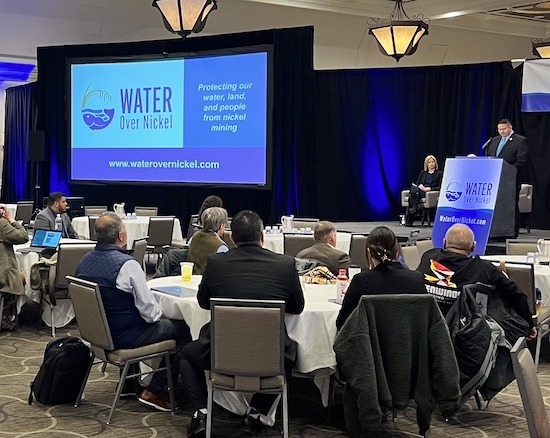
- Details
- By Darren Thompson
The Mille Lacs Band of Ojibwe wants the public to know about the risks that a foreign-owned, multi-billion dollar nickel mine in central Minnesota poses to region’s people, water, fish and Manoomin (wild rice).
To do so, the Tribe has launched “Water Over Nickel”, an online initiative aimed at educating the public on risks associated with nickel mining in the state, particularly the nearby Tamarack Mine, owned by a British Virgin Islands-headquartered company, Talon Metals.
The initiative is a partnership between the Mille Lacs Band of Ojibwe and two conservation organizations: Earthjustice and the Minnesota Center for Environmental Advocacy (MCEA). It was introduced last week at a public event in St. Paul, Minn. featuring allied organizations and scientific experts.
“This mine poses a significant threat to our people, water, fish and Manoomin, as well as the natural environment that all Minnesotans treasure,” Kelly Applegate, Commissioner of Natural Resources for the Mille Lacs Band of Ojibwe, told Native News Online in an email. “Nickel mining has historically damaged surrounding land and watersheds and there is no evidence that it can be done without negative environmental impact.”
In January 2022, electric carmaker Tesla signed a lucrative $1.5 billion deal with publicly traded Talon Metals in which the company agreed to purchase 75,000 tonnes (165 million pounds) of nickel from Talon Metals over six years.
Talon Metals, along with partner Rio Tinto, is hoping to develop 31,000 acres of state and private land in the watershed of the Mississippi River in Tamarack, 50 miles west of Duluth in Aitkin County. The new mine project is currently known as the Tamarack Project, and Ojibwe leaders in the state say that it threatens a treaty right reserved by tribes in the state.
The mine could impact 1837 and 1854 Treaty Rights such as wetlands, where wild rice grows, and fisheries used by the Mille Lacs Band of Ojibwe and the Fond du Lac Band of Ojibwe.
Manoomin, also known as wild rice, is the coveted food that inspired a multi-generation migration of the Anishinaabe people (Ojibwe, Potawatomi, and Odawa Tribes) from the Atlantic Ocean to the Great Lakes area before Europeans arrived in North America. In treaty negotiations in the 1800s, one of the rights many of the Anishinaabe people reserved was to continue to harvest traditional foods in exchange for lands.
Last October, Talon Metals announced it was selected as a recipient of the first projects to be funded by President Biden’s Bipartisan Infrastructure Law. The Biden Administration is committed to increasing domestic manufacturing of batteries for electric vehicles.
After using its advanced exploration system (AES) in October 2021, Tesla released a new estimate of nickel it aims to extract, an increase from 75,000 tonnes to 257,000 tonnes of nickel.
The earliest the mine would get approval for operation would be 2026.
In January, Mille Lacs Band of Ojibwe’s Chief Executive Melanie Benjamin shared the tribe’s plans to oppose the Tamarack Mine in the 39th Annual State of the Band Address.
“There were times when we had to remind federal officials that their legal trust responsibility is to us – not the foreign corporations and mining companies,” Benjamin said.
Mille Lacs Band Commissioner of Natural Resources Kelly Applegate said the risks of the mine are too high. “The impact from the proposed Tamarack Mine has the potential to hurt our community through unproven techniques and empty promises,” Kelly said in an email to Native News Online. “We are not willing to be part of that grand experiment. There is too much at stake.”
More Stories Like This
Gwich'in Tribal Governments Submit Comments Challenging Fish and Wildlife Service's Inadequate Environmental Review of Arctic Refuge Snow RoadRappahannock Tribe Challenges 9M-Gallon Water Plan
Feds release draft long-term plans for Colorado River management
Apache Leader Walks 60 Miles to Court Hearing That Will Decide Fate of Sacred Oak Flat
Rappahannock Tribe Raises Sovereignty and Environmental Concerns Over Caroline County Water Permit
Help us defend tribal sovereignty.
At Native News Online, our mission is rooted in telling the stories that strengthen sovereignty and uplift Indigenous voices — not just at year’s end, but every single day.
Because of your generosity last year, we were able to keep our reporters on the ground in tribal communities, at national gatherings and in the halls of Congress — covering the issues that matter most to Indian Country: sovereignty, culture, education, health and economic opportunity.
That support sustained us through a tough year in 2025. Now, as we look to the year ahead, we need your help right now to ensure warrior journalism remains strong — reporting that defends tribal sovereignty, amplifies Native truth, and holds power accountable.
 The stakes couldn't be higher. Your support keeps Native voices heard, Native stories told and Native sovereignty defended.
The stakes couldn't be higher. Your support keeps Native voices heard, Native stories told and Native sovereignty defended.
Stand with Warrior Journalism today.
Levi Rickert (Potawatomi), Editor & Publisher

